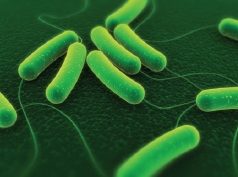Uelzen, Germany—The tragic E. coli outbreak in Europe, having taken the lives of at least 37 people mostly in Germany, has subsided at press time. Though the number of new illnesses has dwindled, the episode leaves lingering questions about organic farming in the minds of the public.
Due to the announcement by authorities that the highly virulent strain of the virus had been traced to an organic bean sprout farm in Lower Saxony, some have tried to link the causes of the outbreak to organic farming practices. One line of reasoning says that because organic farms tend to use manure more often as fertilizer, as opposed to the use of chemical fertilizers on conventional farms, dangerous bacteria like E. coli may be provided with a more fertile growing environment.
In addition to the deaths, upwards of 3,000 people had fallen ill with the EHEC O104:H4 strain of the virus, and many were dealing with Hemolytic Uremic Syndrome, or HUS, a serious complication that can lead to kidney failure. The economic fallout from the scare has cost European farmers millions in produce sales, driven by public fear and a temporary import ban on European vegetables to Russia. German investigators initially blamed imported cucumbers and other produce for the outbreak, before settling on the organic bean sprout farm.
Though the source of the virus may have been an organic farm, experts say it is unclear exactly how the virus developed and was transferred. “It remains unknown where it came from, and until that becomes clearer, it is not possible to say whether organic practices had anything to do with the outbreak,” says Charles Benbrook, Ph.D., chief scientist for The Organic Center. He says the source of the bacteria could have been an isolated water contamination episode, an infected worker or seed contamination.
“But given the unique and dangerous properties of this new strain of E. coli, the critical question is where it came from and why has it become so dangerous? The answers to those questions almost certainly have nothing to do with organic farming practices,” Benbrook says, adding that antibiotic use on conventional livestock farms likely played some role in the emergence of this antibiotic-resistant strain.
Sprouts, in general, pose a higher food safety risk because they are typically consumed raw in salads, with no cooking to kill bacteria, and because they are usually grown, on both organic and conventional farms, in environments conducive to bacterial growth.
The only way an incident of this kind could undermine U.S. consumer confidence in organic is irresponsible or misleading coverage, according to Laura Batcha, chief of policy & external relations for the Organic Trade Association. “Both the U.S. Food and Drug Administration (FDA) and Centers for Disease Control have acknowledged there is no evidence to indicate that organic products are more likely to be contaminated by E. coli,” she says.
Published in WholeFoods Magazine, August 2011










